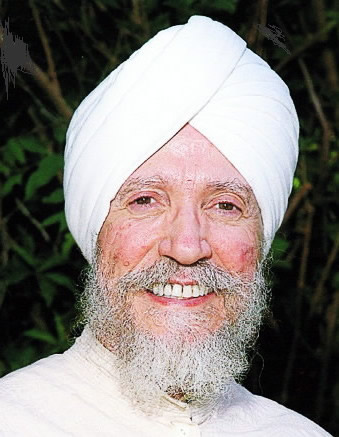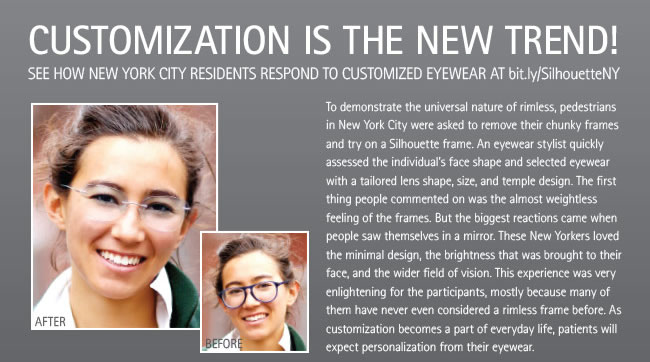My Six Sense
     

Hari Singh Bird
Question: Are you an Optician or an eyeglass merchant?
Opticians are health and wellness providers.
Eyeglass merchants just sell stuff.
Think about this. For the last few decades our collective mindset has manifested as, 'Divided we stand...united we fall.' We must shift to, 'United we stand...divided we fall,’ going forward. 1 Optician plus 1 Optician equals 11 Opticians, i.e., when skilled independent Opticians act together, synergistically, in the common interest, insurance and optical monopolies, as well as unskilled eyeglass merchants will be forced to make changes that will benefit consumers and Opticianry. See 1Plus1Equals11.com and OpticalShiftHappens.com.
 What follows are excerpts from an online discussion, in which I participated, having to do with the state of North Carolina making Opticianry a four-year degree program. What follows are excerpts from an online discussion, in which I participated, having to do with the state of North Carolina making Opticianry a four-year degree program.
 Again, I applaud your fervor and I agree that we can teach the opticians in our employ but how do we reach those employed by others or those in the employ of ODs and MDs if they don't take advantage of the continuing education courses available through their state Opticians Association. In California, there is no CE requirement. Opticians don't need credentialing if they are employed by ODs or MDs because they are employed by a doctor and operate under his license. The state doesn't permit dual licensing (a doctors license and an opticians license) at the same location. A Dispensing Optician's license is issued to a location not a person as long as there is a qualified or licensable optician who manages or owns and manages the location full time. I am a past president of the California Association of Dispensing Opticians and a current Board Member. One of our annual tasks is a CE course that is offered twice per year. Mark Shupnick is a frequent lecturer. We offer 6 units of CE at each seminar, ABO or NCLE approved at a cost of less than $100.00 including lunch and we can't sell out the house. I'm old enough to be a cliché and another cliché comes to mind. "You can lead them to water, but you can't make 'em drink." I believe in your mantra, "Training, training, training", but how do you help those who won't help themselves. (Another cliché.) Again, I applaud your fervor and I agree that we can teach the opticians in our employ but how do we reach those employed by others or those in the employ of ODs and MDs if they don't take advantage of the continuing education courses available through their state Opticians Association. In California, there is no CE requirement. Opticians don't need credentialing if they are employed by ODs or MDs because they are employed by a doctor and operate under his license. The state doesn't permit dual licensing (a doctors license and an opticians license) at the same location. A Dispensing Optician's license is issued to a location not a person as long as there is a qualified or licensable optician who manages or owns and manages the location full time. I am a past president of the California Association of Dispensing Opticians and a current Board Member. One of our annual tasks is a CE course that is offered twice per year. Mark Shupnick is a frequent lecturer. We offer 6 units of CE at each seminar, ABO or NCLE approved at a cost of less than $100.00 including lunch and we can't sell out the house. I'm old enough to be a cliché and another cliché comes to mind. "You can lead them to water, but you can't make 'em drink." I believe in your mantra, "Training, training, training", but how do you help those who won't help themselves. (Another cliché.)
 My six sense. My six sense.
 In the words of my teacher: “When the time is on you, START, and the pressure will be off." In the words of my teacher: “When the time is on you, START, and the pressure will be off."
 Understand up front that there's a lot of what I call 'professional ego', i.e., many 'Opticians' are unable to admit, either through ignorance or antipathy, that they really do not know (through no fault of their own) how to fit handcrafted form-fitting eyewear. (But we never stop learning. See Letter to Eye Care Professionals. See OpticalGuidelines.com for qualifying details and EyewearMoodys.com for examples of craftsmanship.) Understand up front that there's a lot of what I call 'professional ego', i.e., many 'Opticians' are unable to admit, either through ignorance or antipathy, that they really do not know (through no fault of their own) how to fit handcrafted form-fitting eyewear. (But we never stop learning. See Letter to Eye Care Professionals. See OpticalGuidelines.com for qualifying details and EyewearMoodys.com for examples of craftsmanship.)
 Qualified Opticians should be willing to make shift happen going forward, i.e., shift from the decades-old paradigm, “Divided we stand, united we fall,” to “United we stand, divided we fall.” See 1Plus1Equals11.com for more. Qualified Opticians should be willing to make shift happen going forward, i.e., shift from the decades-old paradigm, “Divided we stand, united we fall,” to “United we stand, divided we fall.” See 1Plus1Equals11.com for more.
 Qualifying Opticians should meet via phone conference to discuss the challenges and strategies for organizing a summit amongst them for the purpose of planning and implementing action going forward. I can arrange such a meeting. (Contact me here for contact data.) Qualifying Opticians should meet via phone conference to discuss the challenges and strategies for organizing a summit amongst them for the purpose of planning and implementing action going forward. I can arrange such a meeting. (Contact me here for contact data.)
 Moving forward, qualifying Opticians should discuss a strategy for dealing with monopolistic, predatory and dictatorial insurance companies and wholesale laboratories. (Of course, these challenges cannot be dealt with, nor will any results occur overnight, but “When you come upon a difficult task... start.”) Moving forward, qualifying Opticians should discuss a strategy for dealing with monopolistic, predatory and dictatorial insurance companies and wholesale laboratories. (Of course, these challenges cannot be dealt with, nor will any results occur overnight, but “When you come upon a difficult task... start.”)
 Here’s an apropos quote with which I resonate, the accuracy of which I see emerging. "Today's capitalists have it all backwards. This is the new paradigm: Serve consumers and profit will follow, i.e., service trumps the dollar. Those who fail to put serving consumers first will become irrelevant." Here’s an apropos quote with which I resonate, the accuracy of which I see emerging. "Today's capitalists have it all backwards. This is the new paradigm: Serve consumers and profit will follow, i.e., service trumps the dollar. Those who fail to put serving consumers first will become irrelevant."
I have never thought it was necessary to mandate a four-year degree, although I am not against it.
If the primary push behind the four-year college training push is for acquiring higher pay, Opticians really can't demand more wages considering the deficiencies in the practical training of latter day Opticians with or without a mandated college degree.
The respective agencies representing Opticians must mandate, irrespective of any university level training, is an adequate residency program i.e., practical clinical experience of sufficient duration in the dispensing of hands-on the patient, handcrafted, form-fitting eyewear before certification or licensure.
The Florida Board of Opticianry has taken a tiny step in this direction, to their credit. Hopefully, they will promote a more extensive requirement as a showcase for other agencies.
And if you're in touch with today's media, you'll hear a lot of conversations about America's preoccupation with expensive four-year degree programs for EVERYBODY, to the detriment of candidates for even higher paying trades/skills. In other words, the notion that everybody need not be a college grad in order to be successful is seeping into America's collective consciousness.
This is where the practical training of Opticians and other crafts/trades workers comes in. Opticians must return to the days of 'touch and feel' dispensing skills. This is what the prescription eyewear consumers expect and are willing to pay for, not the pathetic service received in many optical outlets today, including the Internet. Otherwise Opticians are to remain figuratively and literally 'out of touch' with consumers.
All the rhetoric about low wages, who's to blame for loss of market share, the Internet, profit margins, technology, product development, CE hours, monopolistic corporations, predatory insurance companies, etc., etc., is a waste of time. (These issues will pale once Opticians actually serve consumers with what they need and deserve. And the insecurity exhibited by today’s unskilled Opticians will disappear in proportion to their level of practical training.)
As I recall, "Opticianry is ultimately defined by how well the eyewear makes contact with the patient, not by the number of customers served."
So, unless we're willing to change the definition of what Opticians are, and what Opticians do, Opticians, especially senior Opticians, need to commit to this directive, "It is incumbent on those who know to teach those who do not know."
 If an Optician is unskilled or lacking diverse skills in this environment its because they want to be OR something is in the way of that training. A 4 yr degree solves neither cause. Nobody truly makes enough income today. I don't see making more just to pay off new loans as a good bargain. Individual training, I believe, would be much more valuable to the patient. If an Optician is unskilled or lacking diverse skills in this environment its because they want to be OR something is in the way of that training. A 4 yr degree solves neither cause. Nobody truly makes enough income today. I don't see making more just to pay off new loans as a good bargain. Individual training, I believe, would be much more valuable to the patient.
 Here's more. Here's more.
 I will say this again because I agree with some info here and disagree with some info here. Any Optician is only as good as they want to be. A professional Optician seeks out education and spends time passing along his/her knowledge for the betterment of the optical community. He/she also works to find new ways to make the profession better; continually strives to find new avenues for our profession to help others, be it in the business setting or for public good. I will say this again because I agree with some info here and disagree with some info here. Any Optician is only as good as they want to be. A professional Optician seeks out education and spends time passing along his/her knowledge for the betterment of the optical community. He/she also works to find new ways to make the profession better; continually strives to find new avenues for our profession to help others, be it in the business setting or for public good.
Will a 4 year degree make a difference? If it proves that someone is willing to make a monetary and time investment in personal development in order to help others, then I guess it is worthwhile. As I stated before, our profession needs formal education and training. I feel strongly about this because I have seen too many "opticians" that don't know their way around a prescription or a frame.”
 My six sense. My six sense.
I agree with the assertion, "Any Optician is only as good as they want to be." However, I am aware that corporate players employ tactics and policies that subvert this assertion. See ad below. I make this statement based on direct personal experience and I challenge those folks representing corporate interests to put aside their current business plan, and think in longer range terms, assuming they're sincerely interested in the future of Opticianry and serving consumers as healthcare providers.
 "Opticianry is defined by how well the eyewear makes contact with the patient, not by the number of customers served." "Opticianry is defined by how well the eyewear makes contact with the patient, not by the number of customers served."
 "...Today's capitalists have it backwards. This is the new paradigm: Serve consumers and profit will follow, i.e., service trumps the dollar. Those who fail to put serving consumers first will become irrelevant." See ServingVersusSelling.com. "...Today's capitalists have it backwards. This is the new paradigm: Serve consumers and profit will follow, i.e., service trumps the dollar. Those who fail to put serving consumers first will become irrelevant." See ServingVersusSelling.com.
The corporate business models with which I have been previously associated are diametrically opposed to these statements.
Corporate representatives are notoriously opaque and duplicitous when it comes to supporting the education of Opticians and this attitude has made a major contribution to the current status of Opticians and the deficiencies in their craftsmanship skills. Note: Those contributors to this dialogue who are unclear about which I speak should contact me for specifics. See Letter to Eye Care Professionals. Also see OpticalShiftHappens.com.
I hear the sounds-good expressions, "formal education and training" and "quality service" a lot from corporate spokespeople, but where is the corporate support for training people in the art and craft of direct hands-on, handcrafted, 'touch and feel' dispensing skills? Many corporate outlets don't even have dispensers with this knowledge/experience capable of teaching, let alone having managers with these skills. For instance, unskilled managers, i.e., optical managers who have migrated from unrelated fields (such as grocery, photo, pharmacy, etc.) previously advised me, that I was not to spend time training inexperienced dispensers because they were to focus more on increasing sales, not technique. And this occurred with more than one employer.
"Opticianry is defined by how well the eyewear makes contact with the patient.
All Opticianry is local. Eyewear consumers need and deserve the following:
a) Optician-assisted, in-depth lifestyle interview;
b) Optician-assisted, design and selection;
c) Handcrafted, form-fitting eyewear;
d) Free lifetime adjustments and
minor repair services, none of
which are available online."
OpticalGuidelines.com



It's no wonder latter day dispensers do not or cannot customize eyewear.
In this ad, you see no mention of the hands-on craftsmanship required to
fit the eyewear for the visual comfort and long-term wearability of the patient.
Another example of marketing fashion sans handcrafted form-fitting eyewear.
I recall witnessing a senior hands-on skilled Optician being advised they would be terminated if they continued to put "ugly bends" in temples. All the, "...Opticians are only as good as they want to be," attitude in the world is meaningless in this kind of atmosphere, under these management policies.
I challenge corporate players especially to support and promote Opticians "who know...to teach those who do not know." Hands-on, touch and feel craftsmanship training is the only way to upgrade the status of Opticians and the healthcare services for which they are responsible. -- |
